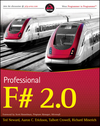begin
# some actions
rescue
# the action when error occurs
else
# the action when error does not occur
ensure
# the final action whether error occurs or not
end
But, in F#, there are two point that is different from ruby.
- There are no clause corresponding else.
- There are only clauses either try/with(corresponding begin/rescue) or try/finally(corresponding begin/ensure)
In other words, clause try/with/finally is Forbidden.
> let results =
- try
- (1 / 0)
- with
- | ex -> "Some error occurs."
- finally
- "Final";;
finally
----^^^^^^^
/Users/youhei/stdin(9,5): error FS0010: Unexpected keyword 'finally' in binding. Expected incomplete structured construct at or before this point or other token.
